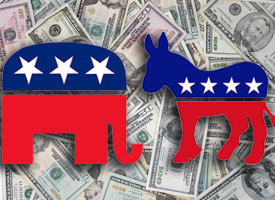Lawyers Favor Boxer, Bankers Favor Fiorina in California Senate Race

In the race for funds, incumbent U.S. Senate Democrat Barbara Boxer has raised over $16 million, doubling Republican challenger Carly Fiorina's over $7 million raised. Would you like to know where all that money on both sides is coming from?
Senator Boxer's number one contributor for the 2010 cycle is currently Girardi & Keese, while Carly Fiorina's top financial contributor is Morgan Stanley. It fits all too neatly into the stereotype of lawyers backing more progressive and Democratic candidates, while the finance industry sides with Republicans.
Boxer's three top industries are, in order: 1) Lawyers, 2) The Retired, and 3) The Entertainment Industry. Fiorina's top three industries in order are: 1) The Retired, 2) Securities & Investment, and 3) Real Estate.
Zooming out to take a look at the campaign coffers of other top officials from the state, California's other U.S. Senator, Dianne Feinstein has raised over $9 Million during the last five years, with PG&E Corp- an energy company- as her top contributor. Her top three industries in order are: 1) Lawyers, 2) The Retired, and 3) Real Estate.
Why examine these sources of campaign contributions?
The purpose of digging deeper is certainly not to throw these fact at candidates as an accusation, but simply to understand what the candidate really stands for when money's on the table. Politicians get money from special interest groups because those groups believe that the politician's policy stances will be favorable to those groups' respective interests.
Politicians typically say the same things on the campaign trail, things that they've identified as issues the voters care about in a particular election cycle. They often make grand promises and they often try to please everybody, but you can often tell what a politician will actually do in office by examining where their money is coming from.
One fantastic tool for finding out more about candidates in your district is OpenSecrets.org by the Center for Responsive Politics. It's easy to use, and you can get a more accurate picture of what a politician really stands for and whose interests he/she most faithfully represents by seeing who's willing to pay money to keep that politician in power.





